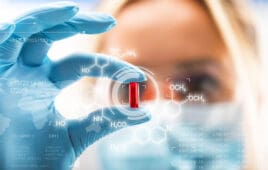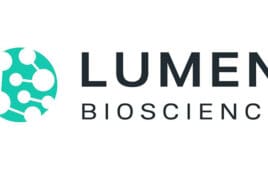
Methicillin-resistant staphylococcus aureus (MRSA) bacteria. [Image courtesy of NIH]
Antimicrobials have become a mainstay of modern medicine, treating everything from localized infections to life-threatening diseases and enabling a wide range of common procedures – such as joint replacements and cesarean sections – to be safely performed with low risk to the patient. However, our reliance on antibiotics has led us to the current dire situation, where multi-drug resistant microbes render many common antibiotics largely ineffective in certain patients, leading to increased mortality from previously treatable conditions. In fact, around 700,000 people die of drug-resistant infections each year.1
Why the lack of antibiotic innovation?
With hundreds of new therapeutics for other conditions reaching the market each year, why then the ongoing shortfall of novel antibiotics? Most markets operate on supply and demand, and currently, there is a huge need for new compounds against novel biological targets. Martin Heidecker is chief investment officer at AMR Action Fund – a venture capital fund with its European office in Basel, Switzerland, that aims to bring two to four new antibiotics to the market by 2030 – and believes that, for the most part, the answer is simply that the rewards are not there for drug developers. Martin explained: “Compared to other disease areas – such as oncology, diabetes and heart disease – the return on investment for developing novel antibiotics isn’t as appealing. Unfortunately, even if a new and effective antibiotic were launched today, it would most likely be classed as a reserve and potentially not used until the patent had expired so that the innovator wouldn’t benefit. However, this wouldn’t decrease the cost of developing the drug, explaining why we don’t see a lot of activity in this space. Furthermore, the cost of a new treatment to the patient is generally more expensive than off-patent drugs. Seemingly, this is accepted in areas such as rare diseases, but less so with antibiotics, which are widely available and relatively inexpensive.”
Basel: A cluster of talent and resources fighting AMR
AMR Action Fund is one of a handful of companies in the Basel area working to tackle the issue of antimicrobial resistance. This region has grown into one of the biggest life sciences hubs in Europe, with over 700 companies now calling it home across sectors including biotechnology, digital health, medical technology, chemistry and advanced manufacturing. It has also long been associated with the pharmaceutical and diagnostics industries – with major players such as Roche, Novartis, Bayer, Johnson & Johnson and Abbott all having headquarters or facilities in the Basel area – as well as several organizations that focus on antimicrobial research, including BioVersys, Polyphor and Selmod.
This mix of industries in one region creates an innovative, nurturing ecosystem with access to specialized personnel and facilities, giving every chance for the successful development of novel antibiotics. Peer Nils Schröder, Head of Corporate Communications and Investor Relations at Basilea – a biopharmaceutical company focused on developing antibiotics and antifungals – commented: “The Basel area is unique in the sense that there is a lot of exchange between large, global corporations and smaller businesses, not only in terms of collaboration and networking but also the movement of personnel. For example, there are opportunities for people to take on additional responsibility in drug development by working in a smaller company, potentially more so compared to larger organizations. So, it’s really give and take, with each individual able to find a role that suits their particular skill set and ambitions.”
This balance between large and small organizations is helping to drive novel antibiotic drug development in Basel. Martin added: “Large pharmaceutical companies certainly exist to improve the overall health of society, but small biotech companies frequently drive innovation. As a result, investing in these very niche sub-sectors is often the best way to contribute to novel solutions. For example, we invest in companies developing small molecules or new chemical entities, as well as those using more innovative approaches, such as antibodies or phage therapies. In fact, one of our first investments was in a beta-lactam and beta-lactamase inhibitor combination, demonstrating the power of cross-discipline working.”
Foundations for a promising future
Drug development continues at a rapid pace across many therapeutic areas, but with the AMR crisis only worsening, it’s crucial that this field isn’t left behind. Tackling AMR is an issue that can’t be solved by a single organization, a sole healthcare agency or even an isolated industry. It must be battled on all fronts, with coordinated efforts from governments and policymakers, and public and private funding partners, alongside the scientists and researchers working at the cutting edge of development.
Biotechnology hubs such as the Basel area in Switzerland have the resources and expertise to respond to this challenge and develop the life-changing innovations needed to fight AMR. The country is renowned for its research institutions, and Basel is found right at the epicenter, with a variety of progressive research programs established in the region, such as INCATE, NCCR Antiresist, SPEARHEAD and at the Basel-based Department of Biosystems Science and Engineering (D BSSE) of ETH Zürich. These are paving the way for future solutions, backed by the wealth of established companies devoting their resources to the cause. To this end, Basel provides a prime example of how an innovative ecosystem can spur drug development, representing a beacon of hope for alleviating the strain of AMR on healthcare systems globally.
References
-

Paul Eschmann
The Review on Antimicrobial Resistance. Tackling drug-resistant infections globally: final report and recommendations. (2016). [Accessed September 28, 2022] https://amr-review.org/Publications.html
Paul Eschmann is the head of international markets and business affairs at Basel Area Business & Innovation. Eschmann joined Basel Area Business & Innovation as Head of International Markets and Business Affairs in March 2022.
Filed Under: Drug Discovery and Development, Infectious Disease





Tell Us What You Think!
You must be logged in to post a comment.